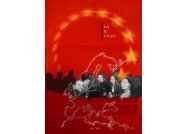turkish-greek civic dialogue - AEGEE Europe
turkish-greek civic dialogue - AEGEE Europe
turkish-greek civic dialogue - AEGEE Europe
Create successful ePaper yourself
Turn your PDF publications into a flip-book with our unique Google optimized e-Paper software.
176<br />
FURTHER THOUGHTS AND ELABORATIONS<br />
WITH THE OCCASION OF THE<br />
CONFERENCE IN ANKARA<br />
My meeting with all those young people who were participating in the project at<br />
the beginning of April 2004 in Ankara, the private conversations, the suggestions<br />
I made, and mainly the big discussion that took place during the last day of the<br />
Final Conference, led me to many interesting thoughts and proposals three of<br />
which I would like to mention here:<br />
st We all need to think that NGOs have nothing to do with the State, or the<br />
1State<br />
Policy – otherwise they would be called Governmental Organisations.<br />
That means that they often support opinions that usually oppose the common<br />
opinion, no matter what this means. It takes a great effort to support one’s<br />
opinion and this effort has severe consequences. Our accession and mainly our<br />
stay and activeness in such organisations are not mere accidental facts. We all<br />
have to work systematically with collaborators, know which values we propose<br />
and which ideas we support, to make clear our ideological context.<br />
nd The existence and activity of NGOs measures how “mature” and how<br />
2close<br />
to Western <strong>Europe</strong> comes a society. It is obvious that in this part there<br />
are important differences between Greece and Turkey that our countries are<br />
in different stages of evolution. Therefore, we have to analyse each case,<br />
to examine what is happening in each country, how many and what kind of<br />
organisations are active, what demands they have, what kinds of people are<br />
involved and who they are representing. Finally we have to see how many<br />
people are involved in this <strong>civic</strong> <strong>dialogue</strong> and mainly who are not participating<br />
and why. The answers to those questions will definitely help understand our<br />
world by showing its limits – and will contribute to a more effective Greek -<br />
Turkish approach.<br />
rd and last. The Greek-Turkish approach, within what we call today the civil<br />
3society,<br />
has a long history and many ups and downs. The most interesting<br />
part in this case is the participation of many young people. So this is what I<br />
propose, something that the previous generation didn’t do for us and neither<br />
did we do it for you– is a complete and detailed report of what is happening;<br />
even starting from this moment. You should cooperate – it needs a lot of work–<br />
and set up a detailed ‘database’ where every relative event will be mentioned:<br />
when it took place, who did it, what was the historical and political context<br />
–this is one of the most significant elements– what problem triggered it, how<br />
the situation was analysed, what were the goals and the means, what where<br />
the results (and how significant they were). By this, we will have a total review<br />
of the matter and the most important; we will be able to put in good use the<br />
knowledge and the experience of the past generation.<br />
I wish to you all success and good luck, and keep up the good work.<br />
Giorgos Mavrommatis<br />
Thessaloniki, 4 September 2004<br />
SOME VIVID NOTES FROM THE FINAL<br />
CONFERENCE ASSESMENT PANEL<br />
EMRAH KURT “As one of the few people here who was working during the<br />
initial preparation of this project five years ago, i am very excited today to be<br />
here at the Final Conference of the project. Yesterday we were talking to friends<br />
and comparing Turkish-Greek relations with Franco-German rapprochement in<br />
60’s. We are in a position and stage, which will be more successful than France-<br />
Germany rapprochement in <strong>Europe</strong> thanks to this dynamism amongst young<br />
people and civil society in both countries. For sure, there are still some people<br />
who do not believe in that and who are still very much sceptic, however these<br />
kind of events and participation of both countries convinced me that many<br />
people here in this room are the main guarantee of the future.”<br />
NUR BATUR “This is the third year that i have been involved in this project.<br />
The first panel discussion was again in Ankara, Middle East Technical University,<br />
and then I was with you at Sakarya University. This is the third time for me at<br />
the final conference of the project. I heard an anecdote from Mr. İlter Türkmen,<br />
Minister of Foreign Affairs once upon a time. In 1974 just after the intervention<br />
of Turkey to Cyprus, Mr. Türkmen was the chief of cabinet of Minister of Foreign<br />
Affairs that time. They were in Washington and they had a meeting with Mr.<br />
Final Conference Association des Etats Généraux des Etudiants de L’<strong>Europe</strong>







